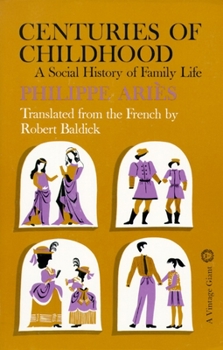Centuries of Childhood: A Social History of Family Life
Select Format
Select Condition 
Book Overview
The theme of this extraordinary book is the evolution of the modern conception of family life and the modern image; of the nature of children. Aries traces the evolution of the concept of childhood... This description may be from another edition of this product.
Format:Paperback
Language:English
ISBN:0394702867
ISBN13:9780394702865
Release Date:July 1965
Publisher:Knopf Doubleday Publishing Group
Length:450 Pages
Weight:0.96 lbs.
Dimensions:0.9" x 5.3" x 8.0"
Customer Reviews
2 ratings
A Paradigm
Published by Thriftbooks.com User , 23 years ago
During the sixties (those were the times!) this was probably the most influential book on education. The funny thing is, that actually it is not at all about education, but its history and how our Western understanding of childhood as a concept has evolved. For everyone who uses to take for granted the values of a sheltered childhood and a period of prolonged 'innocence', it must come as a surprise, how relatively recent, in historical terms, these developments actually had been. In such light, the medieval society and even the Renaissance look very alien, like people from a distant planet. They had a custom to exchange their children in a network of chartered apprenticeships. Once a little sucker had passed the critical age of five and was deemed to be ready to fend for itself, it became time to learn the way of the world, and to be rented out to service at the tables of a trade or of landed nobility. Only a select few received rudimentary tuition and set out on an aca!demic career, which meant years of vagrancy and the open road between Universities and urban centers of learning. As for the pre-school age, the child was a sexless, almost nameless piece of livestock and roamed the townships in street gangs, wore an undistinguished piece of garb, rummaged the garbage dumps and contributed to the family's income with petty theft and beggary. It never washed, hunkered down to torture an unfortunate beetle or wrenched a cat's tail; it learned to drink small beer, in order to escape the diarrhea that lurked in every well. It was on a race against measles, small pocks, diphtheria, and crippling polio, and the odds weren't good. Parents preferred not to involve themselves too emotionally in the frequent deaths of their small ones. A little thing had died, sad, but a replacement is already under way. Scenes from modern day Calcutta come to mind. (This condition was not necessarily class-specific. The future emperor Frederick II (1194-1250), heir t!o the most powerful dynasty of his time, one of the best educated and most enlightened rulers in history, who was fluently conversant in six languages, including Arabic, had passed his early childhood and adolescence as a thieving thug in a Sicilian street-gang. He coined the notorious phrase of the three con-men: Moses, Jesus and Mohammed. Needless to say, the popes took turns to excommunicate this man.) These days, teachers use to complain over class-sizes. I still remember my first year in primary: we first graders shared the same classroom with the second grade, and one teacher took care of both at the same time. But this is idyllic if compared to the beginnings of the modern school system in the late Renaissance! You had first graders of every age between seven and twenty-five sitting in one room with second, third, and fourth graders. Many of the most renowned educators were practising pedophiles and nobody found anything wrong with it. Only gradually, the Jesuits in th!eir colleges set a trend for st
Why do we read hisory books?
Published by Thriftbooks.com User , 24 years ago
Some are historians who judge a book by its accuracy, as a mathematician would judge a treatise on pure mathematics. Some read history for pleasure, as a tourist visits an ancient ruin and is entertained by the stories of the guide. Some (including, in this case, myself) read to answer such questions as that raised in the introduction. Are such structures as the family "hitherto believed to be invariable because they were biological" due to nature or nurture? I would not pretend to judge as a professional historian. As pure entertainment I would rate this below old-fashioned narrative history. If a general reader wants entertainment from the French annalistes then I would recommend the Braudel. It is very France-centered and never ventures outside Western Europe. The tranlation must have presented difficulties since so much depends on the nuances of such terms as "child" and "adolescent" and the use of the second person singular. Sometimes a word such as "greenhorn" is repeated many times, as if it were the usual English expression for a novice or neophyte (was Baldick translating blanc-bec or debutant or dupe? I do not envy. and have every praise for the way in which he has accomplished, his task). So has Aries proved that the special status of childhood and the nuclear family are modern inventions? I still don't know.






